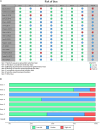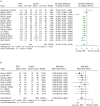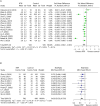Effects of a reminiscence therapy-involved program on anxiety, depression, and the quality of life in cancer patients: a meta-analysis of randomized controlled trials
- PMID: 39355296
- PMCID: PMC11443599
- DOI: 10.3389/fpsyg.2024.1408941
Effects of a reminiscence therapy-involved program on anxiety, depression, and the quality of life in cancer patients: a meta-analysis of randomized controlled trials
Abstract
Objective: Reminiscence therapy is increasingly being utilized for cancer patients to address psychological pressure and enhance their quality of life. This meta-analysis aimed to comprehensively evaluate the effect of a reminiscence therapy-involved program (RTIP) on anxiety, depression, and quality of life in cancer patients.
Methods: A systematic literature search was conducted in the Web of Science, PubMed, Embase, and Cochrane Library databases until December 2023 to screen randomized control trials (RCTs) comparing the effect of RTIP and control care.
Results: A total of 16 RCTs published from 2013 to 2023 were included, with 1,963 cancer patients undergoing RTIP with or without control care (RTIP group, N = 984) or control care (control group, N = 979). The results showed the the anxiety score [standardized mean differences (SMD) = -0.539; 95% confidence interval (CI) = -0.700, -0.378; P < 0.001], anxiety rate [relative risk (RR) = 0.736; 95% CI: 0.627, 0.865; P < 0.001], depression score (SMD = -0.664; 95% CI: -0.967, -0.361; P < 0.001), and depression rate (RR = 0.632; 95% CI = 0.532, 0.750; P < 0.001) were significantly reduced in the RTIP group compared to the control group. Furthermore, overall quality of life was increased in the RTIP group than in the control group (SMD = 0.501; 95% CI: 0.314, 0.689; P < 0.001). In digestive system cancer patients, anxiety/depression scores and rates were reduced, and the overall quality of life was elevated in the RTIP group in comparison with the control group (all P < 0.050). The quality of evidence was generally high, with a low risk of bias in most studies and no publication bias in any outcomes (all P > 0.050).
Conclusion: RTIP attenuates anxiety and depression and improves the quality of life in cancer patients, benefitting their overall health condition.
Systematic review registration: This meta-analysis was registered at PROSPERO with registration number CRD42024563266.
Keywords: anxiety and depression; cancer patients; meta-analysis; quality of life; reminiscence therapy-involved program.
Copyright © 2024 Sun, Su, Yin and Xia.
Conflict of interest statement
The authors declare that the research was conducted in the absence of any commercial or financial relationships that could be construed as a potential conflict of interest.
Figures





Similar articles
-
The effectiveness of reminiscence therapy on anxiety, depression, and quality of life in adult cancer patients: a systematic review and meta-analysis.Support Care Cancer. 2024 Oct 15;32(11):728. doi: 10.1007/s00520-024-08920-6. Support Care Cancer. 2024. PMID: 39402338
-
Efficacy of psychological therapies in people with inflammatory bowel disease: a systematic review and meta-analysis.Lancet Gastroenterol Hepatol. 2023 Oct;8(10):919-931. doi: 10.1016/S2468-1253(23)00186-3. Epub 2023 Aug 3. Lancet Gastroenterol Hepatol. 2023. PMID: 37543040
-
The effectiveness of dignity therapy on hope, quality of life, anxiety, and depression in cancer patients: A meta-analysis of randomized controlled trials.Int J Nurs Stud. 2022 Aug;132:104273. doi: 10.1016/j.ijnurstu.2022.104273. Epub 2022 Apr 28. Int J Nurs Stud. 2022. PMID: 35635908 Review.
-
Cognitive behavioural therapy for tinnitus.Cochrane Database Syst Rev. 2020 Jan 8;1(1):CD012614. doi: 10.1002/14651858.CD012614.pub2. Cochrane Database Syst Rev. 2020. PMID: 31912887 Free PMC article.
-
Technology-based and digital interventions for intimate partner violence: A systematic review and meta-analysis.Campbell Syst Rev. 2022 Aug 27;18(3):e1271. doi: 10.1002/cl2.1271. eCollection 2022 Sep. Campbell Syst Rev. 2022. PMID: 36909881 Free PMC article. Review.
References
-
- Carbajal-Lopez E. B., Juarez-Garcia D. M., Sanchez-Jauregui T. J., Espinoza-Velazco A., Calderillo-Ruiz G., Salas-Benavides R., et al. . (2022). Psychological distress, fatigue and quality of life in patients with gastrointestinal stromal tumors. Psychol. Russ. 15, 3–13. 10.11621/pir.2022.0201 - DOI - PMC - PubMed
Publication types
LinkOut - more resources
Full Text Sources

